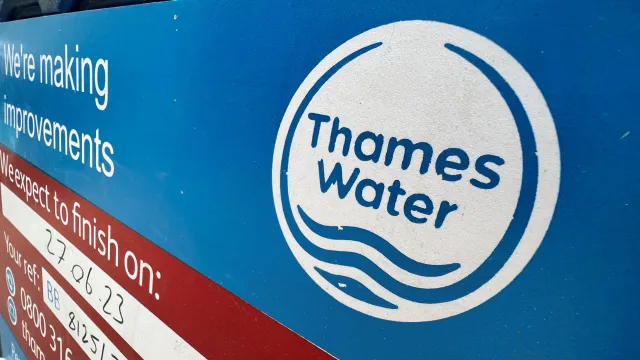From artisanal crepes to rebellious cheesecake waffles, Reading's breakfast rebels are transforming morning meals. These seven spots will revolutionize how you start your day.
Residents across the Thames Water region are expressing their disgust at the company's plans to increase water bills, following years of sewage spills and overflowing sewers in scenic waterways. The proposed price hike, which could see bills rise by more than 50% over the next five years, has ignited a wave of anger among communities already grappling with the environmental impact of sewage dumping.
Potential for Renewed Protests
The controversial move by Thames Water may reignite protests over the ongoing sewage issue, as residents feel they are being asked to pay more for a service that has consistently failed to meet environmental standards. With scenic waterways bearing the brunt of sewage overflow, the planned bill increase has struck a nerve with those who have long suffered the consequences of inadequate infrastructure.
Thames Water's Controversial Bill Hike Proposal

Source: https://inews.co.uk/news/thames-water-bill-hike-prime-example-failure-privatisation-3249873
Thames Water, the utility company serving the region, has announced plans to increase water bills by more than 50% over the next five years. This proposed price hike comes at a time when residents are already grappling with the environmental consequences of sewage spills and overflowing sewers in scenic waterways.
The timing of this announcement has struck a raw nerve with communities across the Thames Water region. For years, residents have endured the sight and smell of sewage contaminating their local rivers and streams. The company's failure to adequately address these issues has left many feeling frustrated and betrayed by a service they rely on daily.
Community Outrage and Environmental Concerns
The reaction from residents has been swift and overwhelmingly negative. Many have expressed their disgust at being asked to pay significantly more for a service that has consistently failed to meet basic environmental standards. The juxtaposition of higher bills against a backdrop of polluted waterways has fueled a sense of injustice among customers.
Local environmental groups and concerned citizens have long been documenting the impact of sewage spills on wildlife and recreational areas. The proposed bill increase appears to be adding insult to injury for those who have witnessed firsthand the degradation of once-pristine water bodies.
Potential for Renewed Protests
The controversial move by Thames Water may reignite protests over the ongoing sewage issue. In recent years, there have been demonstrations against the company's environmental record, with activists and residents demanding action to prevent sewage dumping and improve infrastructure.
With this latest development, there are indications that community organisers and environmental advocates may be preparing for a new wave of protests. The combination of environmental concerns and financial burden could mobilise a broader cross-section of the population, potentially leading to more widespread and sustained opposition to Thames Water's practices and pricing policies.
Looking Ahead: Implications for Thames Water and Customers
As the situation unfolds, Thames Water faces a significant challenge in justifying the proposed price increase to its customers. The company will need to address not only the financial aspects of the hike but also demonstrate concrete plans for improving its environmental performance and upgrading aging infrastructure.
For residents, the coming months may bring difficult decisions about household budgets and potential participation in protest actions. The issue also raises broader questions about the regulation of water utilities and the balance between necessary infrastructure investments and fair pricing for consumers.
As this story develops, it is likely to remain a focal point of public discourse in the region, with potential implications for water management policies and corporate accountability in the utilities sector.
Public Trust and Corporate Responsibility
The proposed bill hike by Thames Water has brought the issue of public trust in utility companies to the forefront. As residents grapple with the prospect of significantly higher water bills, questions are being raised about the company's commitment to its customers and the environment. This situation highlights the delicate balance between corporate financial interests and the responsibility to provide essential services while maintaining ecological integrity.
The controversy surrounding Thames Water's decision may prompt a broader discussion about the accountability of utility companies and the need for more stringent oversight. Regulators and policymakers may face increased pressure to review the current framework governing water utilities, potentially leading to reforms that prioritise both consumer protection and environmental stewardship.
Long-term Environmental Impact
While the immediate focus is on the financial burden for residents, the long-term environmental consequences of continued sewage spills cannot be overlooked. The Thames region's ecosystems, including its diverse aquatic life and the broader food chain, may face prolonged stress if the issue remains unresolved. This ecological impact could have far-reaching effects on local biodiversity, recreational activities, and even the region's tourism industry.
Environmental scientists and conservationists may seize this moment to advocate for more comprehensive studies on the long-term effects of sewage pollution in the area's waterways. Such research could inform future policy decisions and infrastructure investments, potentially shifting the conversation from short-term financial considerations to long-term environmental sustainability.
Community Empowerment and Grassroots Action
The controversy surrounding Thames Water's bill hike proposal may serve as a catalyst for increased community engagement and grassroots action. Residents who were previously uninvolved in local environmental issues may find themselves drawn into advocacy and activism. This heightened civic participation could lead to the formation of new community groups, citizen-led monitoring initiatives, and collaborative efforts to hold Thames Water accountable.
Local councils and community leaders may play a crucial role in channeling public sentiment into constructive dialogue with Thames Water and regulatory bodies. The emergence of a more engaged and informed citizenry could reshape the dynamics between the utility company and its customers, potentially leading to more transparent communication and community-driven solutions to the region's water management challenges.